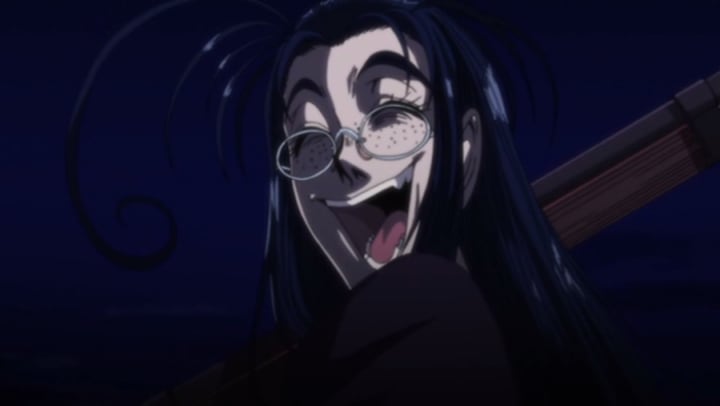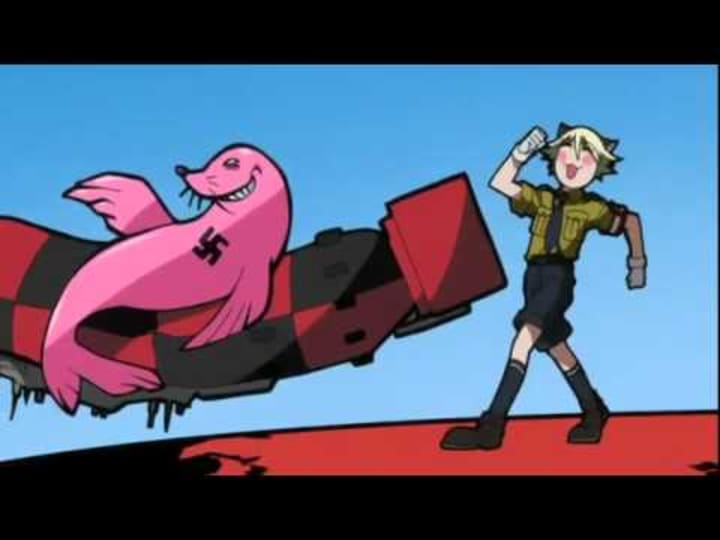Let's discuss Antisemitism in Anime
An in depth look on both Antisemitic and Nazi rhetoric in anime and manga.

(-Disclaimer, the author of the article (myself) is not Jewish, however many of my writings focuses on brining light to issues faced by marginalized groups even if I am not apart of the. That said, I am aware that not all Jewish people will share the views written in this article, I just wanted to write about some of the things I've seen said by Jewish people. If I offend, please let me know!-)

If you’ve been watching anime for a while now, you are aware there are influences from real life and other cultures depending on what you tune into.
Some influence and imagery can be good, positively representing other cultures and people while others can be bad. In some cases, straight up harmful.
In the case of Nazi imagery and influence in anime, in addition to straight up Antisemitic themes--such genres are always harmful and alienating to Jewish and other marginalized fans a like. Unfortunately, Nazi imagery and Antisemitic undertones have been present in my of our favorite animes.
From old classics to new, Nazi imagery whether it be subtle or blatant has weaved its way into many fan favorites, causing not just a normalization of such harmful content but also, festering alt right and Antisemitic agendas in fandoms; many agendas alienate Jewish and other marginalized fans.
More so, portraying Nazi themes or characters as goofy, light hearted, funny or even in many cases, ‘cool’ or ‘bad ass’ humanizes actual Nazis. It desensitizes viewers to the true atrocities of Nazi while attempting to paint them in a likable light. In reality, Nazis--whether they are in some of our favorite anime or manga or whether they are real life Nazis--are all terrible and shouldn’t be romanticized, supported or shown in positive lights.
These points may raise a few questions.
First and foremost, what animes have Nazi and Antisemitic themes and where do such themes come from. Secondly, what can you (or I) as an avid anime watcher to make sure fandoms spaces are safe for Jewish fans?
Let’s discuss first, why such imagery is common in anime and manga today.
During World War II, it is common knowledge that Japan joined with Germany during the war--at that time, Germany was also Nazi Germany. However, their history ties back further to that, as both Germany and Japan had been allies since World War I. However, WW II offered different ideologies and tactics that both countries shared. Military expansion for one, imperialism, control of certain resources and more importantly--pride in one’s monoracial race. These ideas also tie back Japanese Nationalism-something that has existed far before World War II and the idea and belief that monoracial Japanese people are superior--everyone else, especially Asian people who are not Japanese, are inferior. Such ideologies caused extreme hardships for other Asian countries during World War II and before--from the atrocities such as the Raping of Nanjing and even the tragedy of Korean Comfort women (these are just two examples of many), Japanese Nationalism has done a lot of harm.
With this idea that others were inferior, such thoughts aligned with ideas of monoracial superiority--Nazi Germany and Japan strengthened ties as WW II went on. So much so that, Nazi and Fascists propaganda and relationships were common in Japan throughout WW II. Some of this sentiment still exists today.
Along with Japanese Nationalism and racist sentiment toward Asian communities who aren’t Japanese being prevalent in Anime, we at the same time, see Nazi imagery as well as Antisemitic undertones in some franchises as well.
Some examples?

Let’s start with one of the most famous and perhaps in your face versions - Hetalia.
It’s full title Hetalia: Axis Powers says it all in the name. The webcominc, later adapted into a manga and anime, follows the lives and narratives of three protagonists who just so happen to be named and based off of the Axis powers during WW II. This is concerning for a number of reasons.
From creating a character based off of the perception of the Aryan race, to humanizing, and making light of actual groups of people who were extremely harmful to various communities during WW II - primarily Jewish and Romani people, Hetalia can be seen as an example of Nazi imagery and by default, it has Antisemitic undertones. Again, looking at Germany--he is the perfect image of the Aryan ideology Nazi Germany was attempting to promote during World War II. From his blond hair, blue eyes and built structure, to actually sporting a Nazi military outfit with Nazi regalia, his very existence is a sign of Nazi imagery.
“It’s just a cartoon”, some people may say and not even realize just how awful it is to have an actual Nazi prototype being humanized, and somewhat romanticized in an anime and by fandom. It’s extremely important to realize that, it’s not just a cartoon or a design--millions of Jewish people were sought out, killed, and mistreated because they did not fit a Nazi prototype (and of course, because of Hitler and Germany’s Antisemitic laws and beliefs) that is so carelessly being romanticized in a cartoon.

It is arguably more than a cartoon because such a character had real life, negative and tragic undertones for people who did not look like him. His mere presence was an excuse for genocide and eugenics.
It doesn’t just stop there. People cosplay the character of Germany, in actual Nazi regalia without understanding just how awful and traumatic that can be for Jewish anime fans—or in many cases they do, they simply do not care. Without paying mind to the harmful consequences that come with humanizing and dressing up as a cosplay Nazi, fans in turn desensitize and in many cases ignore the real life tragedies caused by the Nazis.

Another franchise we see similar attitudes in? Hellsing Ultimate—an adaption of the Hellsing Manga.
For a reader of the manga and a viewer of Helllsing Ultimate, the idea that the show was Antisemitic and had Nazi propaganda may be confusing given the main characters fought against Nazis. While that much is true, Hellsing still has issues with romanticizing Nazis, humanizing them and making them likable enough to have fandoms. It was clear that the Nazis were the ‘bad guys’, yet it was also clear to those who watched, that there were more players--such as the Catholic Church who was seen as an aggressor- yet more so than the Nazis. This isn’t to exempt the Catholic Church for its crimes, or ignore the fact that historically half of the Catholic church supported the Nazis and is just Antisemitic in general.
However, it’s to paint a picture of how Hellsing Ultimate treated and humanized both antagonist groups. The Catholic Church--specifically Iscariot, was seen as very one dimensional where as, the Nazis were given more depth, character and were written to be likable as villains, and to some even anti-heroes.

From real Nazi imagery glorified, to Nazi propaganda, while Hellsing Ultimate did not shy away from condemning the Nazi’s, it sure didn’t do a good job at reminding fans just how awful they were. From making characters like Rip Van Winkle and Schrodinger--fan favorites--have an array of designs and personalities that drew in viewers--it is clear that Kouta Hirano--the creator of Hellsing, was not intending for viewers to hate the Nazi characters fully.


The point being, you do not humanize a group of people who caused atrocity throughout the globe--those affects still visible today—if you yourself are determined to paint them as irredeemable monsters. You do not humanize people who are responsible for over six million deaths, by making them humorous, or “nekos”, or animating them in cutesty, pastel background at some points.

That isn’t what you do if your intention is to make the fandom hate said characters. Portraying such characters as even slightly likable, or humorous again, desensitizes people to their true atrocities. Similar to Hetalia, viewers either do not understand, nor care about the horrible consequences that follow humanizing Nazi characters. In addition, this makes Antisemitic undertones even more difficult to recognize and condemn.
We are already starting to see this with very successful animes and mangas.

In more modern years, we have seen the beginning, middle and now the end of an extremely popular manga, Shingeki no Kyojin or Attack on Titan. If I sat down here and discussed the impact that the manga has made, we would be reading this for hours. However, in short, AoT by Hajime Isayama is no doubt one of the most popular animes to date. Opinions aside, its fame cannot be ignored.
Regardless, if we must recognize how far it’s gone, it’s also important to discuss its impact and the harmful tropes it too, carries within the narrative.
First and foremost, many have tied Isayama’s beliefs and writings within the manga to Japanese Nationalism. From basing one of his supporting characters off of Akiyama Yoshifuru, a Japanese General responsible for many atrocities against Korean and Chinese civilians, to noting that he saw this man as a hero, those are red flags right there.
Further more, many have pointed out antisemitic dog whistles and imagery in the portrayal of the Yeagerists and their relation to the Eldians. With comparisons of genocide, conspiracy theories, and a secret faction controlling the world--many have deemed Attack on Titan--major parts of the series to be Antisemitic and have clearly antisemitic and Nazi imagery (this even includes some of the uniforms).
Critiquing AoT has been a slow process however, many fans, Jewish fans specifically are usually shut down when it comes to discussing any form of critical thinking regarding the show. As the manga is coming to a conclusion, many in depth discussions about the harmful nature of the show are usually ignored.
These aren’t the only examples--as Nazi imagery in anime is far more frequent then people would like to believe. From things such as Saga of Tanya the Evil, to “sweet” movies like In this Corner of the World, it is typically terrifyingly common to see such imagery.
That said--it’s important to really really listen to Jewish fans when they speak about how harmful certain plots and themes are in shows. Listen to dog whistles--common ones are the “conspiracy theories (i.e--a group of people are controlling the world)”, the lizard man species, and that Jewish people are somehow linked to the apocalypse (on a side note--Umbrella Academy is chalk full of these). In addition, pay attention to hints of nationalism in Anime as well, as this is very often linked to Antisemitism, and noticing tropes would be helpful to both Jewish and Asian groups who aren’t Japanese.
And lastly, if Jewish fans are telling you a franchise or author is harmful, don’t ignore, or harass them in your efforts to protect a problematic show or creator. If fandom is supposed to be a safe space for all, then that includes marginalized fans as well.





Comments
There are no comments for this story
Be the first to respond and start the conversation.